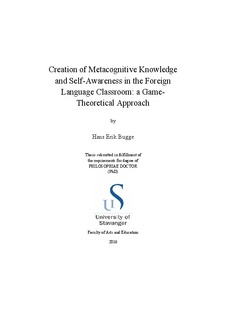| dc.contributor.author | Bugge, Hans Erik | |
| dc.date.accessioned | 2017-01-31T13:45:35Z | |
| dc.date.available | 2017-01-31T13:45:35Z | |
| dc.date.issued | 2016-12-15 | |
| dc.identifier.citation | Creation of Metacognitive Knowledge and Self-Awareness in the Foreign Language Classroom: a Game-Theoretical Approach by Hans Erik Bugge, Stavanger : University of Stavanger, 2016 (PhD thesis UiS, no. 324) | nb_NO |
| dc.identifier.isbn | 978-82-7644-688-3 | |
| dc.identifier.issn | 1890-1387 | |
| dc.identifier.uri | http://hdl.handle.net/11250/2429065 | |
| dc.description | Doktorgradsavhandling i Lesevitenskap | nb_NO |
| dc.description.abstract | The overall objective of this research has been the quest to increase the understanding of how metacognitive knowledge can be taught in the foreign language classroom. It revolves around the following research questions:
1. What kinds of metacognitive learner beliefs does the implementation of a separate Strategy Based Instruction (SBI) programme in three foreign language classrooms (German, French and Spanish) yield in terms of the metacognitive categories of Creating motivation, Seeking practice opportunities, and Acquisition of grammar, pronunciation and vocabulary?
2. What kind of information does the collective metacognitive structure of the learner beliefs expressed in research question 1. yield about the relevance of the SBI programme implemented for the purpose of this research?
3. What are the pedagogical implications of research questions 1. and 2. for separate SBI in the foreign language classroom in line with the recommendations of the CEFR 1and the LK062 curriculum?
Metacognitive knowledge is the ability to close the gap between declarative and procedural knowledge in the language learning process (J. Michael O'Malley & Chamot, 1990). Anderson's ACT* theory (Anderson, 1996) was applied in order to analyse the collective cognitive structure of the metacognitive meaning constructed during the project period. The SBI programme was modelled as three conversational games (Osborne & Rubinstein, 1994; Pietarinen, 2007), during which the maximisation of relevance (Sperber & Wilson, 1986, 1995; Wilson & Sperber, 2012) was induced. The research was a qualitative intervention which produced a multiple longitudinal exploratory case study.
The analysis indicated that the constructed collective declarative knowledge provided the collective classroom context with scarce opportunites for proceduralisation. The time and quality of the effort spent on the objectives of the CEFR and the LK06 were raised as critical issues. The argument is that SBI in the foreign language classroom should be more targeted than the general conversational model developed for the purpose of this research. This is allegedly due to the fact that a conversational model aimed at the development reform. of metacognitive knowledge needs to be firmly anchored in the individual needs of the learners in the foreign language classroom in order to produce the most relevant outcome at an aggregate level. | nb_NO |
| dc.language.iso | eng | nb_NO |
| dc.publisher | University of Stavanger, Norway | nb_NO |
| dc.relation.ispartofseries | PhD thesis UiS;324 | |
| dc.rights | Copyright the author, all right reserved | |
| dc.rights | Navngivelse 4.0 Internasjonal | * |
| dc.rights.uri | http://creativecommons.org/licenses/by/4.0/deed.no | * |
| dc.subject | utdanningsvitenskap | nb_NO |
| dc.subject | lesevitenskap | nb_NO |
| dc.subject | språkfag | nb_NO |
| dc.title | Creation of Metacognitive Knowledge and Self-Awareness in the Foreign Language Classroom: a Game-Theoretical Approach | nb_NO |
| dc.type | Doctoral thesis | nb_NO |
| dc.rights.holder | Forfatteren | nb_NO |
| dc.subject.nsi | PhD thesis in Educational Sciences | nb_NO |
| dc.subject.nsi | VDP::Social science: 200::Education: 280 | nb_NO |

